新概念英语第一册写作必备
新概念第一册词汇和语法笔记
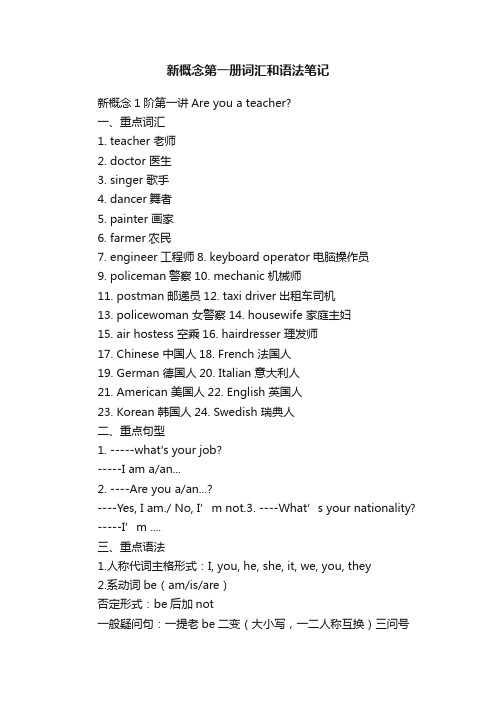
新概念第一册词汇和语法笔记新概念1阶第一讲Are you a teacher?一、重点词汇1. teacher 老师2. doctor 医生3. singer 歌手4. dancer舞者5. painter 画家6. farmer农民7. engineer工程师8. keyboard operator 电脑操作员9. policeman警察10. mechanic机械师11. postman邮递员12. taxi driver出租车司机13. policewoman 女警察14. housewife 家庭主妇15. air hostess 空乘16. hairdresser 理发师17. Chinese 中国人18. French 法国人19. German 德国人20. Italian 意大利人21. American 美国人22. English 英国人23. Korean 韩国人24. Swedish 瑞典人二、重点句型1. -----what's your job?-----I am a/an...2. ----Are you a/an...?----Yes, I am./ No, I’m not.3. ----What’s your nationality? -----I’m ....三、重点语法1.人称代词主格形式:I, you, he, she, it, we, you, they2.系动词be(am/is/are)否定形式:be后加not一般疑问句:一提老be二变(大小写,一二人称互换)三问号3.be动词与人称代词主格关系:我用am,你用are, is连着他她它;单数用is,复数要用are新概念1阶第二讲Is this your shirt?一、重点单词shelf架子floor地板desk课桌table桌子dressing table梳妆台television电视newspaper报纸magazine杂志stereo立体声音响cupboard柜橱blouse女式衬衫tie领带hat帽子case箱子colour颜色(color)green绿色yellow黄色red红色pink 粉色orange橘色blue蓝色purple 紫色brown 棕色white白色black 黑色二、重点句型1.Whose shirt is that?It’s Tim’s.2.What colour is it?It's blue.3.give sb. sth=give sth. to sb.给某人某物三、语法1.形容词性物主代词my, your, his, her, our, your, their, its用法:形物代胆子小,需加名词做保镖宾格:me, you, him, her, it, us, you, them用法:宾格放在动词介词后,做宾语2.名词所有格:人名+’s(Tim’s, Sunny’s...) 意思是“...的”Lily’s book丽丽的书3.this这个these这些that那个those那些this指离说话人近的,that指离说话人远的新概念1阶第三讲A new dress一、重点词汇wife妻子hat帽子handbag手提包dress连衣裙colour颜色green绿色photograph照片valley山谷hill小山village村庄bank河岸water水swim游泳park公园same相同的lovely可爱的smart聪明的upstairs楼上come来building大楼,建筑物二、句型What colour’s your new dress?It’s green.That’s a nice dress.三、语法:冠词和介词不定冠词a/an用法:表泛指,第一次出现a/an区别:元音音素前用an,辅音音素前用a注意:字母u开头单词,发字母本身音时用aa university, a useful bookan umbrella首字母不发音情况:an hour, an honest boy定冠词the用法特:特指the book复:第二次提及there is a book, the book is mine.定:序数词最高级前加thethe first one, the tallest boy独:独一无二事物前加thethe earth, the sun类:表类别,the+形容词表示一类人the poor, the richthe+姓氏复数表示某某一家人the Whites怀特一家人特殊:西洋乐器及二胡前必加the, play the piano/guitar/violin 介词用法:in在...里面on在...上面(有接触)under在...下面next to在...旁边near在附近beside在旁边between两者之间in the middle of在...中间(多者)in front of在前面behind后面on the left在左边on the right在右边into在...里面out of从里面出来along沿着across横穿off离开above在...上面(没有接触)with和...一起新概念1阶第四讲Your passports, please!一、重点词汇1. passport 护照2. tourist 旅游者3. Dutch 荷兰人4. Russian 俄罗斯人5. Danish 丹麦人6. Norwegian 挪威人7. sales rep 推销员8. officer 官员9. office assistant 办公室助手10. postman 邮递员11. milkman 送奶工12. customs 海关二、重点句型1. Are you Swedish?Yes, we are.No, we aren't.Are these your cases?Yes, they are.No, they aren't.三、重点语法:名词单数变复数名词单数变复数规则1. 直接+s;2.以s,x,ch,sh结尾的单词加es3.辅音字母+y,变y为i+es;4.以f/fe结尾,变f/fe为v+es;5.hero, potato, tomato, mango以o结尾单词要加es不规则变化口诀:1.男人女人a变eman-men woman-women2.鱼鹿绵羊不用变fish-fish deer-deer sheep-sheep3.鹅足牙oo变eegoose-geese foot-feet tooth-teeth4.中日不变、英法变,其余“s”加后面, 重点提防德国人,德国人加“s”. Chinese-Chinese Englishman-EnglishmenAmerican-AmericansGerman-Germans5.孩子要加ren,老鼠ous变ic, child-children mouse-mice新概念1阶第五讲Which book?一、重点单词1. give 给2. box 箱子3. fork 叉子4. spoon 勺子5. glass 杯子6. cup 茶杯7. bottle 瓶子8. big 大的9. small 小的10. large 大的11. little 小的12. sharp 锋利的13. blunt 钝的14. light 轻的15. heavy 重的16. empty 空的17. full 满的18. tall 高的19. short 矮的20. hot 热的21. cold 冷的22. old 年迈的23. young 年轻的24. thin 瘦的25. fat 胖的26. busy 忙的27. lazy 懒惰的二、重点句型1. Give me a ..., please.2. ----Which one? -----The big one.三、重点语法形容词比较级和最高级的变化规则1. 一般单音节词后+er/est;2. 以不发音字母e结尾的单音节词+r/st;3. 重读闭音节结尾,末尾只有一个辅音字母,双写最后一个字母+er/est;4. 辅音字母+y结尾的双音节词,变y为i,加er/est;5. 部分双音节词和多音节词比较级前加more,最高级前加the most6.特殊变化:两坏两好两多一少一远一老bad/ill-worse-the worstgood/well-better-the bestmany/much-more-the mostlittle-less-the leastfar-farther/further-the farthest/the furthestold-older/elder-the oldest/the eldest新概念1阶第六讲Where is Sally?一、重点单词shut v.关shut the door关门open v.开open the door开门dust v.掸dust the table掸桌子上的灰尘sweep v.扫sweep the floor扫地read v.读read books读书sharpen v.削sharpen the pencil削铅笔make v.做make the bed铺床climb v.爬climb the hills爬山run v.跑run after the dog追赶小狗type v.打字type the letter打字empty v.倒空empty the bottle倒空瓶子turn on打开turn off关上put on clothes穿衣服take off clothes脱衣服eat v.吃drink v.喝clean v.清洁swim v.游泳tap n.水龙头garden n.花园tree n.树grass n.草二、语法: 现在进行时和祈使句1.结构:主语+am/is/are+现在分词+其他2.句型否定句:be后加not一般疑问句:一提二变三问号3.现在分词变化规则直接加ing, look-looking以不发音e结尾单词去e加ing, make-making重读辅元辅双写尾字母加ing, swim-swimming以ie结尾单词,改ie为y加ing, die-dying tie-tying4.标志词:now现在at the moment此刻look看listen听祈使句1.定义表达请求或命令,省略主语You.2.构成:动词原形+其他eg: Shut the door.Be careful.Let me help you.3.否定形式:在动词原形前面加noteg: Don't be late.新概念1阶第七讲Don’t drop it!一、重点单词1.careful adj.小心的,仔细的2.vase n.花瓶3.flower n.花4.drop v.掉下,落下二、语法:一般将来时态1.定义:表示计划、打算将要做某事2.结构:主语+am/is/are going to+动词原形+其他3.句型变化否定句:am/is/are后面加noteg: She is not going to go shopping after work.一般疑问句:一提二变三问号(同现在进行时变法)eg: I am going to swim.-Are you going to swim?-Yes, I am.-No, I'm not.特殊疑问句:特殊疑问词+一般疑问句eg: What are you going to do?注意:特殊疑问词有what什么who谁where哪里which哪一个why为什么when何时whose谁的how怎样4.时间标志词tomorrow系列tomorrow morning/afternoon/eveningthe day after tomorrow后天next系列next year/month/week/weekend/Mondayin+段时间系列表示多久之后in two days/ten years/a week...不可数名词1.特点:前无a/an后无s2.不可数名词可借助量词来表达数量,例如:a piece of cheesea cup of coffee3.常见不可数名词口诀金(gold/money)木(wood)水(water)火(fire)土(soil),肉(meat,beef,chicken,pork,fish等)面(flour/bread)布(cloth,paper)食(food)茶(tea),液体(water,milk,juice,coffee,tea等)粉末类(dust,salt, sugar),均为不可数。
新概念英语第一册重点词汇和语法(完整版)
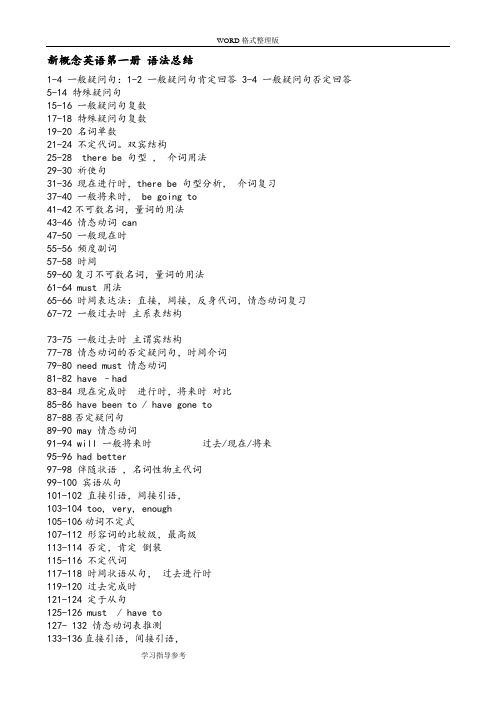
新概念英语第一册语法总结1-4 一般疑问句:1-2 一般疑问句肯定回答 3-4 一般疑问句否定回答5-14 特殊疑问句15-16 一般疑问句复数17-18 特殊疑问句复数19-20 名词单数21-24 不定代词。
双宾结构25-28 there be 句型,介词用法29-30 祈使句31-36 现在进行时,there be 句型分析,介词复习37-40 一般将来时, be going to41-42不可数名词,量词的用法43-46 情态动词 can47-50 一般现在时55-56 频度副词57-58 时间59-60复习不可数名词,量词的用法61-64 must 用法65-66 时间表达法:直接,间接,反身代词,情态动词复习67-72 一般过去时主系表结构73-75 一般过去时主谓宾结构77-78 情态动词的否定疑问句,时间介词79-80 need must 情态动词81-82 have –had83-84 现在完成时进行时,将来时对比85-86 have been to / have gone to87-88否定疑问句89-90 may 情态动词91-94 will 一般将来时过去/现在/将来95-96 had better97-98 伴随状语,名词性物主代词99-100 宾语从句101-102 直接引语,间接引语,103-104 too, very, enough105-106动词不定式107-112 形容词的比较级,最高级113-114 否定,肯定倒装115-116 不定代词117-118 时间状语从句,过去进行时119-120 过去完成时121-124 定于从句125-126 must / have to127- 132 情态动词表推测133-136直接引语,间接引语,137-138 条件状语从句139-140宾语从句141-144 被动语态Lesson 1 Excuse me1. Words1) excuse (1)重音(2)与sorry 的区别(3)Excuse 用的不同场景a. 请别人让路b. 引起别人的注意c. 打断别人的谈话d. 可以当n. 借口 eg. No excuse. 别找借口,没有借口。
新概念英语第一册文章
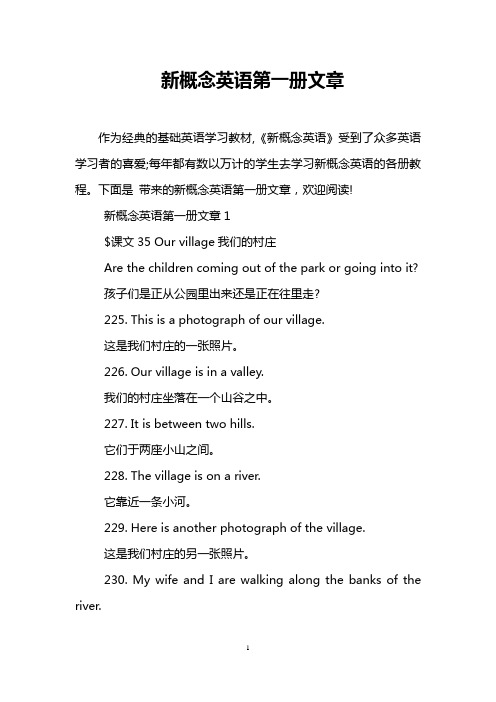
新概念英语第一册文章作为经典的基础英语学习教材,《新概念英语》受到了众多英语学习者的喜爱;每年都有数以万计的学生去学习新概念英语的各册教程。
下面是带来的新概念英语第一册文章,欢迎阅读!新概念英语第一册文章1$课文35 Our village我们的村庄Are the children coming out of the park or going into it?孩子们是正从公园里出来还是正在往里走?225. This is a photograph of our village.这是我们村庄的一张照片。
226. Our village is in a valley.我们的村庄坐落在一个山谷之中。
227. It is between two hills.它们于两座小山之间。
228. The village is on a river.它靠近一条小河。
229. Here is another photograph of the village.这是我们村庄的另一张照片。
230. My wife and I are walking along the banks of the river.我和妻子沿河岸走着。
231. We are on the left.我们在河的左侧。
232. There is a boy in the water.河里面有个男孩。
233. He is swimming across the river.他正横渡小河。
234. Here is another photograph.这是另一张照片。
235. This is the school building.这是学校大楼。
236. It is beside a park.它位于公园的旁边。
237. The park is on the right.公园在右面。
238. Some children are coming out of the building. 一些孩子正从楼里出来。
新概念英语1-21 摘要写作
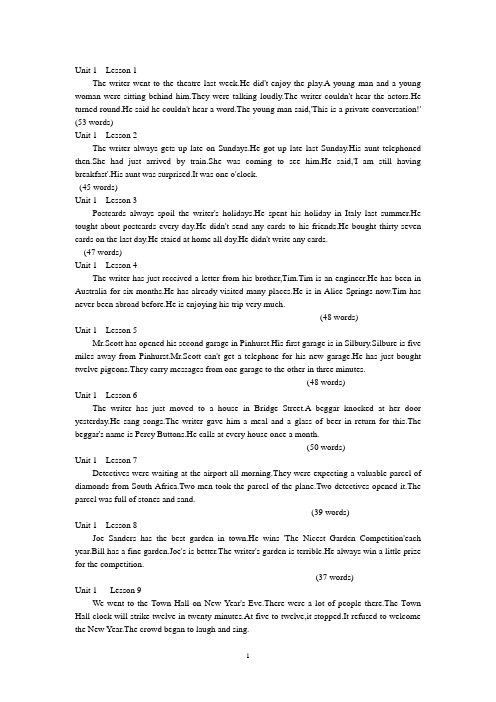
Unit 1 Lesson 1The writer went to the theatre last week.He did't enjoy the play.A young man and a young woman were sitting behind him.They were talking loudly.The writer couldn't hear the actors.He turned round.He said he couldn't hear a word.The young man said,'This is a private conversation!' (53 words)Unit 1 Lesson 2The writer always gets up late on Sundays.He got up late last Sunday.His aunt telephoned then.She had just arrived by train.She was coming to see him.He said,'I am still having breakfast'.His aunt was surprised.It was one o'clock.(45 words)Unit 1 Lesson 3Postcards always spoil the writer's holidays.He spent his holiday in Italy last summer.He tought about postcards every day.He didn't send any cards to his friends.He bought thirty-seven cards on the last day.He staied at home all day.He didn't write any cards.(47 words)Unit 1 Lesson 4The writer has just received a letter from his brother,Tim.Tim is an engineer.He has been in Australia for six months.He has already visited many places.He is in Alice Springs now.Tim has never been abroad before.He is enjoying his trip very much.(48 words)Unit 1 Lesson 5Mr.Scott has opened his second garage in Pinhurst.His first garage is in Silbury.Silbure is five miles away from Pinhurst.Mr.Scott can't get a telephone for his new garage.He has just bought twelve pigeons.They carry messages from one garage to the other in three minutes.(48 words)Unit 1 Lesson 6The writer has just moved to a house in Bridge Street.A beggar knocked at her door yesterday.He sang songs.The writer gave him a meal and a glass of beer in return for this.The beggar's name is Percy Buttons.He calls at every house once a month.(50 words)Unit 1 Lesson 7Detectives were waiting at the airport all morning.They were expecting a valuable parcel of diamonds from South Africa.Two men took the parcel of the plane.Two detectives opened it.The parcel was full of stones and sand.(39 words)Unit 1 Lesson 8Joe Sanders has the best garden in town.He wins 'The Nicest Garden Competition'each year.Bill has a fine garden.Joe's is better.The writer's garden is terrible.He always win a little prize for the competition.(37 words)Unit 1 Lesson 9We went to the Town Hall on New Year's Eve.There were a lot of people there.The Town Hall clock will strike twelve in twenty minutes.At five to twelve,it stopped.It refused to welcome the New Year.The crowd began to laugh and sing.(46 words)Unit 1 Lesson 10We own an old clavichord.It was made in 1681.My grandfather bought the instrument many years ago.A visitor damaged it recently.She tried to play jazz on it.She broke two of the strings.My father's friend is repairing it now.(45 words)Unit 1 Lesson 11I was having dinner at a restaurant.I see Tony Steele after a while.He always borrows money from his friends.Tony sat at my table.I asked him to lend me twenty pounds.He gave me the money at once.He wanted me to pay for his dinner.(49 words)Unit 1 Lesson 12We'll meet Captain Charles Alison at Portsmouth Harbour eary tomorrow moring.He will be in his small boat,Topsail.He will leave at eight o'clock.We'll say goodbye to him.He will take part in an importantrace across the Atlantic.(40 words)Unit 1 Lesson 13The Greenwood Boys are singers.They will be coming here tomorrow.Most of the young people will be meeting them at the station.They will gave five peiformances.The police will be trying to keep order as usual.(38 words)Unit 1 Lesson 14The writer gave a lift to a young man in the south of France last year.They greated each other in French.The writer doesn't speak any French.They sat in silence.The young man said,'Do you speak English?' at the end of the journey.He was English himself.(49 words)Unit 1 Lesson 15Mr.Harmsworth wanted see me.I felt nervous.I went into his office.He said business was very bad.The firm couldn't pay such large salaries.Twenty people had already left.He didn't ask me to leave.He offered me an extra thousand pounds a year!(47 words)Unit 1 Lesson 16Traffic police usually give you a ticket if you park your car in the wrong place.The writer found a polite note on his car in Sweden.The traffic policeman wanted him to pay attention to their street sighs.Everyone can't fail to obey a request like this.(48 words)Unit 1 Lesson 17My aunt Jennifer is an actress.She is over thirty years old.She often appears on the stage as a young girl.Jennifer will act the part of a girl of seventeen in a new play soon.She never tells anyone how old she really is.(46 words)Unit 1 Lesson 18The writer had lunch at a village pub.She couldn't find her bag after her meal.She couldn'tpay the bill.The landlord soon found it for her.His dog had taken it into the garden.(36 words)Unit 1 Lesson 19The play was going to begin at any moment.I asked for two tickets.There were none left.Susan and I were disappointted.A man hurried to the ticket office just then.He returned two tickets.They were for next Wednesday's performance.I bought them.(45 words)Unit 1 Lesson 20Fishing is the writer's favourite sport.Some unlucky fisherman catch old boots and rubbish.The writer isn't not so lucky.He never catches anything.He isn't really interested in fishing.He is only interested in sitting in a boat and doing nothing at all.(44 words) Unit 1 Lesson 21The writer is slowly going mad.He lives near an airport.Passing planes can be heard night and day.Most of his neighbours have left their homes.He has been offered money to leave.He determined to stay here.Everyone says he must be mad.They are probably right.(49 words)Lesson 26The writer studies art and paints a lot of pictures. Many people do not really understand modern art. Paintings do not always have a meaning. They are sometimes pretty patterns. Young children not only appreciate modern paintings better than others but they notice more. The writer's young sister went into his room yesterday and examined his new picture. He had hung it upside down and she noticed this immediately. (68 words)Lesson 32A woman did a detective watch in a large store one Monday. She bought some small articles and then she choose an expensive dress. The assistant wrap it up and she take it with her. She did not pay for it so the detective arrested her. Her daught was the assistant. She gave her mother a free dress once a week.lesson 33One afternoon, the girl set out from the coast and she was caught in a storm. Her bout was strike a rock, so she jumped into the sea. She swam for 8 miles that night. Early next morning, she reached the shore. She had seen a light high up on the cliffs and she climbed up. A day later, she found herself in the hospital.Lesson 52The writer has been trying to get his new room in order all morning. This has proved difficult because he owns over a thousand books which cover every inch of floor space at the moment. His sister helped him to carry one of his old bookcases up the stairs a short while ago. She got a surprise when she saw the room, but she thought that the books made a pretty carpet.Lesson 68Elizabeth tried to avoid meeting Nigel Dykes, even though she wasn't able to do so.As he always insisted on accompanying her, she had to think of a way of preventing him from following her around. when she told him she was going to the dentist, he said he would come with her because he thought there's always plenty to read in the waiting room.Lesson77Doctors have just operated on the mummy of an Egyptian woman who died in 800B.C.They wanted to find out whether she died of a rare disease. After removing a section of the mummy, they sent it to a laboratory. During the operation, they unexpectedly found a small wax figure of god. Though they were afraid the mummy would fall to pieces, it successfully survived the operation. (69words)Lesson 86The moment the speedboat struck the buoy, both men were thrown into the water. As it moved off very quickly across the water, the men began to swim towards the shore. Turning in a circle, the speedboat came straight towards them. After it had just missed them, they swam until they were out of danger. When the boat returned it had lost speed. Soon all the petrol was used up and it floated across the water. (76 words)Lesson 87At the time of the murder, the man claimed that he had been travelling on the 8 o'clock train to London and had arrived at work on time. When the inspector asked if a later train would get him to work on time, the man agreed it would but said that he always travelled early. The inspector suggested that he was lying because, that morning, the 8 o'clock train broke down, so the man must have caught the 8. 25.(79 words)Lesson 88Six men who have been trapped in a mine for seventeen hours may lose their lives because rescue operations are proving difficult. Since explosives might cause the roof of the mine to collapse, rescue workers are drilling a hole through hard rock, but progress is slow. Two hours ago, a microphone was lowered into the mine and the men have been in touch with their relatives. They are running short of food and drink but they are in good spirits.(80 words)Lesson 89The local cinema was packed because the P & U Bird Seed Company was presenting a free comedy show. As many of the artistes who should have appeared failed to turn up, the show was very dull. The funniest thing we heard came at the beginning from the advertiser who introduced the programme saying, ‘This is the Poo and Ee Seed Bird Company. Good ladies, evening and gentlemen!’ (68 words)Lesson 90Divers working on North Sea oil rigs are often terrified by giant fish that bump into them when they are working in deep water. These fish are not sharks or whales. On the contrary, they are favourite eating varieties that grow to unnatural sizes. Three factors have caused this to happen:the first is the warmth from oil-pipes; the second is the supply of plentiful food; the third is the absence of fishing round the rigs.(76 words)Lesson 91While circling the balloon, the pilot saw three men in the basket, one of whom was holding a pair of binoculars. When it flew over the station, one of the men took photographs. Then it landed near an airfield, but the police could not arrest anyone because the basket contained two Members of Parliament and the Commanding Officer of the station. Afterwards the Commanding Officer explained that one half of the station did not know what the other half was doing. (81 words)Lesson 92The writer returned home at about two in the morning and rang the doorbell. Having failed to wake up his wife, he put a ladder against the wall and began climbing towards the bedroom window. Suddenly a policeman called out, but the writer answered him rudely. He told him he had forgotten his key. The shouting woke his wife. She opened the window just as the policeman had started climbing the ladder after him. (74 words)Lesson 93The Statue of Liberty, which was presented to the United States of America by the French people in the 19th century, was designed by Bartholdi and built on a metal frame constructed by Eiffel. The site chosen for it was an island at the entrance of New York Harbour, where a pedestal had to be built. The statue was erected in Paris in 1884 and re-erected two years later in America. It was officially presented in October, 1886. (78 words)lesson 94The Statue of Liberty was presented to the United States of America by the French people in the 19th century. Though designed by Bartholdi, it was built on a metal frame constructed by Eiffel. The site chosen for it was an island at the entrance of New York Harbour and a pedestal had to be built. The statue was first erected in Paris in 1884, but it was re-erected two years later in America and officially presented in October, 1886. (80 words)Lesson 95While the Ambassador of Escalopia was in his office, university students set the basement of the Embassy on fire. When the Ambassador went to investigate, a man called Horst aimed a fire extinguisher at him because he thought that the Ambassador was on fire. Moreover, there was a hole in the Ambassador's hat which had been made when someone fired a shot through his office window. The Ambassador was lucky, for he was not wearing it at the time. (78 words)Lesson 96The Japanese annual Festival for the Dead is a cheerful occasion. As the dead are said to return home, food is laid out for them and lanterns are lit to guide them on their way. People dance and sing all night and the uneaten food is thrown into the sea or into a river the next morning. In some places, the lanterns are placed on the sea and people watch from the shore until the lanterns drift out of sight.(80 words)。
新概念1知识点

新概念1知识点一、词汇。
1. 基础词汇。
- 数字:one, two, three等,要掌握数字的拼写、读音以及基本的数学运算表达,如“two plus three is five”(二加三等于五)。
- 家庭成员:father, mother, son, daughter, brother, sister等,学会描述家庭关系,例如“My father is a teacher”(我的父亲是一名教师)。
- 颜色:red, blue, green, black, white等,能够用颜色描述物品,如“This pen is blue”(这支笔是蓝色的)。
- 日常用品:pen, pencil, book, bag, desk, chair等,可用于描述周围环境或个人物品,如“There is a book on the desk”(桌子上有一本书)。
2. 动词短语。
- 起床:get up,例如“I get up at seven o'clock every morning”(我每天早上七点起床)。
- 去上学:go to school,如“He goes to school by bike”(他骑自行车去上学)。
- 吃(饭):have/eat,“I have breakfast at home”(我在家吃早饭)。
3. 方位介词。
- in:表示在……里面,如“There is a cat in the box”(盒子里有一只猫)。
- on:表示在……上面(表面接触),“The book is on the table”(书在桌子上)。
- under:表示在……下面,“The ball is under the chair”(球在椅子下面)。
二、语法。
1. 一般现在时。
- 概念:表示经常发生的动作或存在的状态。
- 结构:- 主语是第三人称单数(he/she/it等)时,动词要加 -s或 -es。
例如“He likes reading books”(他喜欢读书)。
新概念英语第一册写作必备

新概念英语第一册写作必备——功能句型1. as… as… 结构as soon as 一……就……例:I will tell him as soon as I see him.as soon as possible 尽快例:He asked me to come back as soon as possible.as +形容词或副词的原级+as 像…一样例:This building looks as high as that one.2. ask 句型ask (sb.) for sth. 向……要/求……例:He felt too a sham ed to ask us for help.ask/tell sb. (how) to do sth. 告诉某人怎么做某事例:They asked / told us to return the book on time.ask/tell sb. (not) to do sth. 让某人(不要)做某事例:The old man asked / told us not to swim in the river.3. get句型get +比较级变得……例:People’s life is getting better and better.get ready for/get sth. ready 为…做好了准备/准备好了……例:We should get ready for the difficulty.4. keep 句型keep sb. doing 让某人一直做某事例:He kept me waiting for half an hour.keep doing 坚持做某事例:Keep studying, maybe one day you can join us.keep/make sth. + adj. 让……怎么样例:The teacher asked us to keep the classroom clean. The news made her happy.5. find 句型find it + adj. to do sth. 发现做某事怎么样例:They found it impossible to get enough money.find sb. do/doing sth. 发现某人做/正在做某事例:I find the boys flying kites in Tian’anmen Square.6. help句型help sb. (to) do / help sb. with sth. 帮助某人做某事/在……方面帮助某人例:They helped us to cross the river.My brother helped me with the problem.7. 四个花费sb. spend some time/some money on sth. / (in) doing sth.例:We spent much time reading.Don’t spend so much money on clothes.It takes sb. some time to do sth.例:It takes me half an hour to read books every day.It cost sb. some money to do sth. / sth. cost sb. some money例:It cost me 200 yuan to buy the wallet.The wallet cost me 200 yuan.sb pays some money for sth.例:I paid 200 yuan for the wallet.8. prefer 句型prefer to 更喜欢做某事例:I prefer cats to dogs.Prefer A to B / prefer to doing A to doing B 喜欢A胜过B /喜欢做A胜过做B 例:We prefer to eat out.I prefer doing homework to going shopping with you.9. see/hear sb. do/doing sth. 看见/听见某人做/正在做某事例:I saw him come into your room.I hear him singing songs next door.10. afraid 句型be afraid of sth. / doing sth./ to do sth. / that 害怕某事/做某事/……例:She is afraid of spiders.I am afraid of staying at home alone. = I am afraid to stay at home alone. She was afraid that the dog would bite.I’m afraid that … 恐怕……例:I’m afraid that I cannot go with you.11. busy 句型be busy doing sth. 忙于做某事例:He was busy finishing his work.12. be + adj. + for 句型be famous/late/sorry for … 因……而著名/迟到……/对……抱歉例:He was late for school yesterday.New York is famous for tall buildings.I’m sorry for your father’s death.13. glad句型be glad that 很高兴……例:I’m glad that he’s feeling better.14. 就近一致的句型either … or 要么……要么……例:You can either write or phone me.neither…nor 既不…也不…例:He neither knows nor cares what happened.not only … but also 不仅…而且…例:Not only my parents but also my sister has been to the Great Wall.There be 有例:There is a bed, a table and some chairs in her bedroom.15. 比较级句型It is the second + 最高级+ n. 这是第二……例:It is the second most expensive hat.…is one of the + 最高级+ n (pl) … 最……之一例:It is one of the highest buildings in the world.The + 比较级, … the + 比较级… 越……, 越……例:The harder he works, the happier he feels.比较级and 比较级越来越…例:Our motherland is becoming stronger and stronger.16. V+doing 句型enjoy/hate/like/finish/stop/mind/keep/go on + doing sth.例: He enjoys / likes watching TV at home.I hate working on Sundays.They finished / kept / went on repairing the broken bike.I don’t mind going shopping tomorrow.The students stopped talking when the teacher came in.17. V+sth. to sb. 句型give/show/bring/lend/send/pass/tell sth. to sb.例:Please pass / show / lend / bring / send the book to me.My mother told the story to me.He gave the picture to Tom yesterday.18. V + sb. sth.buy/give/show/bring/lend/send/pass/tell sb. sth.例:My father bought / gave / showed / passed me the new bike. Kate told me the news.He lent / sent / gave me his new dictionary.19. V+ sb. do sth.make / let / have sb. (not) do sth.例:The teacher made / let / had the students clean the classroom.20. had better 句型had better (not) do sth. 最好做/不要做某事例: You’d better study hard. / You’d better not smoke.21. It 句型It is + adj. for sb. to do sth. 做某事怎么样例:It is important for us to protect the environment.It looks like / It sounds like … 看起来像/听起来像例:It looks like a cartoon character.It sounds like a nice room.It seems to sb. that 看起来……例:It seems to us that he knew everything.It sounds + adj. / It looks + adj. 听起来……/看起来……例:It sounds great!It looks nice!It’s bad / good for... 对……不好/有好处例:It’s bad for us to watch TV for a long time.It’s good for us to get up early.It’s time for / to do sth.该……了例:It’s time to go home.It’s time for dinner.It’s two meters (years) long (wide, high, tall …) ……长/高/宽例:It’s ten meters high.22. not … at all 一点也不例:I don’t want to pla y football at all.23. not … until… 直到……才例:He didn’t come home until 2 o’clock.24. one … the other / some … others 一个…… 另一个/ 一些…… 另一些例:I have two aunts; one lives in Tokyo and the other in Osaka.Some students are playing basketball and others are playing tennis.25. so … that… 如此…… 以至例:The box is so heavy that we couldn’t carry it.26. such a + adj + n + that 如此…… 以至例:It is such an interesting book that we all want to read it.27. too … to … 句型太…… 而不能例:He is too young to go to school.28. thank sb. for sth. / doing sth. 为…… 感谢某人例:Thank you for your help. / Thank you for helping me.29. used 句型used to do sth. 过去常常做某事/ be (get,become) used to sth./doing sth. 习惯做某事例:He used to smoke.He is used to hard work. / He gets used to getting up early.30. take和bring例:Please bring me some coffee. (带来)I took an umbrella with me. (带走)31. wrong 和matter 句型There is sth. wrong with ….What’s the matter with …?What’s wrong with …?例:There is something wrong with my computer.What’s the matter with your bike?What’s wrong with your bike?32 表达自己和询问别人的意见I don’t think that …I would like to / Would you like to …Why not do / Why don’t you do sth.?Will (Would, Could) you please do sth.?What about /How about doing sth.?It’s a good idea to do sth.例:I don’t think that he can win the match.I would like to go for a walk.Would you like to / please go with me?Why not go with me? / Why don’t you go home?How / What about going swimming this afternoon?It’s a good idea to watch English movies to improve your listening.。
最全的新概念英语第一册语法汇总
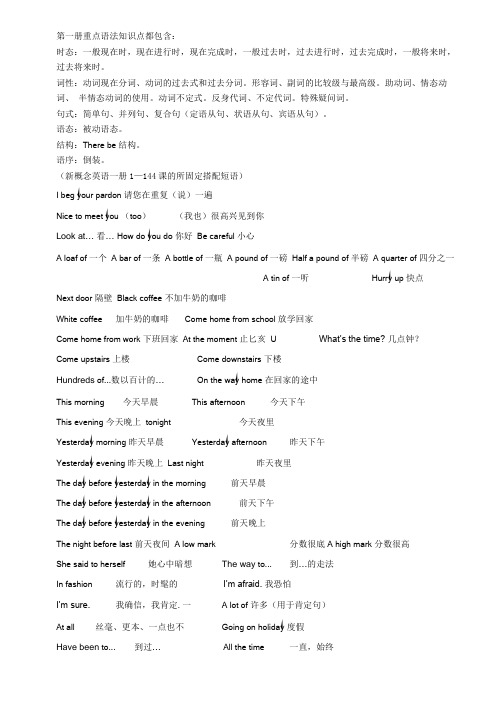
第一册重点语法知识点都包含:时态:一般现在时,现在进行时,现在完成时,一般过去时,过去进行时,过去完成时,一般将来时,过去将来时。
词性:动词现在分词、动词的过去式和过去分词。
形容词、副词的比较级与最高级。
助动词、情态动词、半情态动词的使用。
动词不定式。
反身代词、不定代词。
特殊疑问词。
句式:简单句、并列句、复合句(定语从句、状语从句、宾语从句)。
语态:被动语态。
结构:There be结构。
语序:倒装。
(新概念英语一册1—144课的所固定搭配短语)I beg your pardon 请您在重复(说)一遍Nice to meet you (too)(我也)很高兴见到你Look at… 看… How do you do 你好Be careful 小心A loaf of 一个 A bar of 一条 A bottle of 一瓶 A pound of 一磅Half a pound of 半磅 A quarter of 四分之一A tin of 一听Hurry up 快点Next door 隔壁Black coffee 不加牛奶的咖啡White coffee 加牛奶的咖啡Come home from school放学回家Come home from work 下班回家At the moment 止匕亥U What’s the time? 几点钟?Come upstairs 上楼Come downstairs 下楼Hundreds of...数以百计的…On the way home 在回家的途中This morning 今天早晨This afternoon 今天下午This evening 今天晚上tonight 今天夜里Yesterday morning 昨天早晨Yesterday afternoon 昨天下午Yesterday evening 昨天晚上Last night 昨天夜里The day before yesterday in the morning 前天早晨The day before yesterday in the afternoon 前天下午The day before yesterday in the evening 前天晚上The night before last 前天夜间 A low mark 分数很底A high mark 分数很高She said to herself 她心中暗想The way to... 到…的走法In fashion 流行的,时髦的I’m afraid. 我恐怕I’m sure.我确信,我肯定.一 A lot of 许多(用于肯定句)At all 丝毫、更本、一点也不Going on holiday 度假Have been to... 到过…All the time 一直,始终Have been to…到过…Drive into…撞倒.•・For sale 供出售、出售Have the last word 最后决定、最后才算The R.A.F. 英国皇家空军Return ticket 往返票Next door to... 与..•相邻,在..•隔壁In five hours’time在五小时之后。
新概念英语1笔记
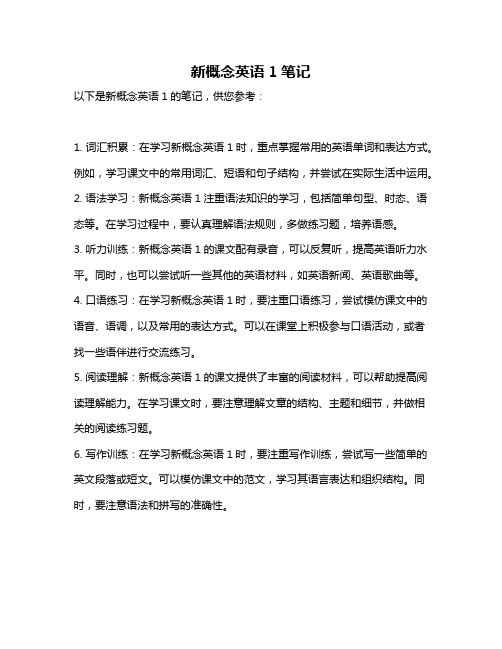
新概念英语1笔记
以下是新概念英语1的笔记,供您参考:
1. 词汇积累:在学习新概念英语1时,重点掌握常用的英语单词和表达方式。
例如,学习课文中的常用词汇、短语和句子结构,并尝试在实际生活中运用。
2. 语法学习:新概念英语1注重语法知识的学习,包括简单句型、时态、语态等。
在学习过程中,要认真理解语法规则,多做练习题,培养语感。
3. 听力训练:新概念英语1的课文配有录音,可以反复听,提高英语听力水平。
同时,也可以尝试听一些其他的英语材料,如英语新闻、英语歌曲等。
4. 口语练习:在学习新概念英语1时,要注重口语练习,尝试模仿课文中的语音、语调,以及常用的表达方式。
可以在课堂上积极参与口语活动,或者找一些语伴进行交流练习。
5. 阅读理解:新概念英语1的课文提供了丰富的阅读材料,可以帮助提高阅读理解能力。
在学习课文时,要注意理解文章的结构、主题和细节,并做相关的阅读练习题。
6. 写作训练:在学习新概念英语1时,要注重写作训练,尝试写一些简单的英文段落或短文。
可以模仿课文中的范文,学习其语言表达和组织结构。
同时,要注意语法和拼写的准确性。
新概念一重点课文

新概念一重点课文一、Lesson 1 - Excuse me!1. 课文内容。
- 这篇课文主要围绕日常的礼貌用语展开。
例如:“Excuse me! Yes?”“Is this your handbag?”“Pardon?”“Thank you very much.”这些简单的句子展示了在询问物品所属关系时的基本对话。
2. 重点词汇。
- excuse:原谅;handbag:手提包;pardon:原谅,请再说一遍;thank:感谢。
3. 语法要点。
- 一般疑问句:“Is this your handbag?”这是一个典型的一般疑问句结构,be 动词(is)放在句首,回答是“Yes, it is.”或者“No, it isn't.”二、Lesson 3 - Sorry, sir.1. 课文内容。
- 课文描述了一个男孩不小心挡住了一位先生的路,先生让他走开,男孩道歉的场景。
“My coat and my umbrella please. Here is my ticket. Thank you, sir. Number five. Here's your umbrella and your coat. This is not my umbrella. Sorry, sir. Is this your umbrella? No, it isn't.”2. 重点词汇。
- umbrella:雨伞;ticket:票;sir:先生。
3. 语法要点。
- 指示代词:“This is not my umbrella.”中的“this”是指示代词,用来指代近处的事物。
三、Lesson 7 - Are you a teacher?1. 课文内容。
- 这是一个关于询问职业的简单对话。
“I am a new student. My name's Robert. Nice to meet you. My name's Sophie. Are you French? Yes, I am. Are you French too? No, I am not. What nationality are you? I'm Italian. Are you a teacher? No, I'm not. What's your job? I'm a keyboard operator.What's your job? I'm an engineer.”2. 重点词汇。
新概念第一册英语作文

新概念第一册英语作文I woke up this morning feeling refreshed and ready to take on the day. The sun was shining through my window, and I could hear the birds chirping outside. It was the perfect start to a new day.As I made my way to the kitchen, the smell of freshly brewed coffee filled the air. I poured myself a cup andtook a moment to savor the rich, bold flavor. There's nothing quite like that first sip of coffee in the morning.After breakfast, I decided to go for a walk in the park. The crisp morning air was invigorating, and I enjoyed the peacefulness of the park before it got crowded with people.I took in the sights and sounds of nature, feeling grateful for the beauty that surrounded me.Back at home, I sat down at my desk and started working on a new project. I love the feeling of being productiveand getting things done. It's satisfying to see my hardwork pay off in the end.In the evening, I met up with some friends for dinner. We had a great time catching up and sharing stories. It's always nice to spend time with good company and enjoy good food.As I lay in bed at the end of the day, I reflected on all the moments that made it special. It's the little things that make life meaningful, and I'm grateful for each and every one of them.。
新概念英语第一册知识点总结
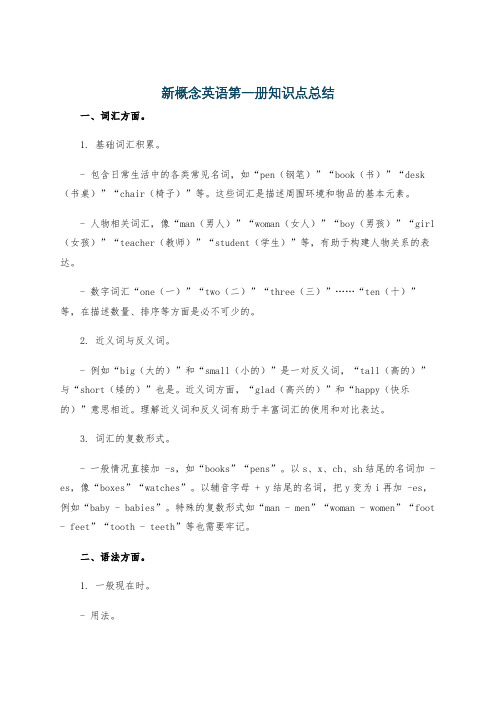
新概念英语第一册知识点总结一、词汇方面。
1. 基础词汇积累。
- 包含日常生活中的各类常见名词,如“pen(钢笔)”“book(书)”“desk (书桌)”“chair(椅子)”等。
这些词汇是描述周围环境和物品的基本元素。
- 人物相关词汇,像“man(男人)”“woman(女人)”“boy(男孩)”“girl (女孩)”“teacher(教师)”“student(学生)”等,有助于构建人物关系的表达。
- 数字词汇“one(一)”“two(二)”“three(三)”……“ten(十)”等,在描述数量、排序等方面是必不可少的。
2. 近义词与反义词。
- 例如“big(大的)”和“small(小的)”是一对反义词,“tall(高的)”与“short(矮的)”也是。
近义词方面,“glad(高兴的)”和“happy(快乐的)”意思相近。
理解近义词和反义词有助于丰富词汇的使用和对比表达。
3. 词汇的复数形式。
- 一般情况直接加 -s,如“books”“pens”。
以s、x、ch、sh结尾的名词加 -es,像“boxes”“watches”。
以辅音字母 + y结尾的名词,把y变为i再加 -es,例如“baby - babies”。
特殊的复数形式如“man - men”“woman - women”“foot - feet”“tooth - teeth”等也需要牢记。
二、语法方面。
1. 一般现在时。
- 用法。
- 表示经常或习惯性的动作或状态。
例如:I get up at six every day.(我每天六点起床。
)- 表示客观事实或真理。
The earth goes around the sun.(地球绕着太阳转。
)- 句子结构。
- 主语为第三人称单数(he/she/it等)时,动词要加 -s或 -es。
如:He likes reading.(他喜欢阅读。
)- 主语为第一人称(I)、第二人称(you)以及复数主语(we/they等)时,动词用原形。
最全的新概念英语第一册语法汇总
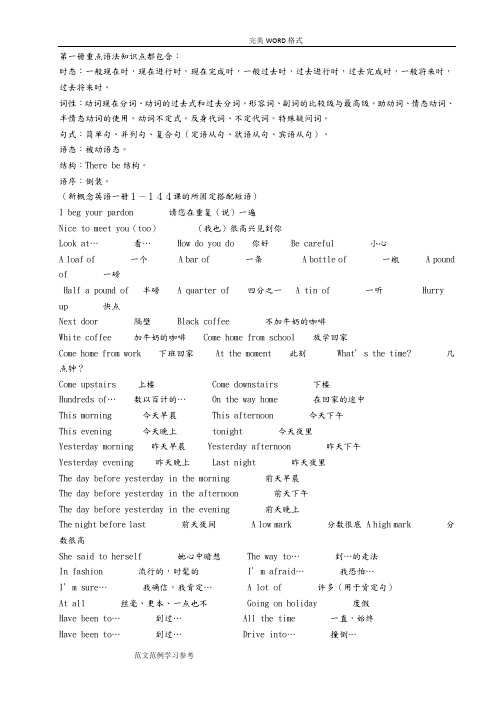
第一册重点语法知识点都包含:时态:一般现在时,现在进行时,现在完成时,一般过去时,过去进行时,过去完成时,一般将来时,过去将来时。
词性:动词现在分词、动词的过去式和过去分词。
形容词、副词的比较级与最高级。
助动词、情态动词、半情态动词的使用。
动词不定式。
反身代词、不定代词。
特殊疑问词。
句式:简单句、并列句、复合句(定语从句、状语从句、宾语从句)。
语态:被动语态。
结构:There be结构。
语序:倒装。
(新概念英语一册1-144课的所固定搭配短语)I beg your pardon 请您在重复(说)一遍Nice to meet you(too)(我也)很高兴见到你Look at…看… How do you do 你好 Be careful 小心A loaf of 一个 A bar of 一条 A bottle of 一瓶 A pound of 一磅Half a pound of 半磅 A quarter of 四分之一 A tin of 一听 Hurry up 快点Next door 隔壁 Black coffee 不加牛奶的咖啡White coffee 加牛奶的咖啡 Come home from school 放学回家Come home from work 下班回家 At the moment 此刻What’s the time?几点钟?Come upstairs 上楼 Come downstairs 下楼Hundreds of…数以百计的… On the way home 在回家的途中This morning 今天早晨 This afternoon 今天下午This evening 今天晚上 tonight 今天夜里Yesterday morning 昨天早晨 Yesterday afternoon 昨天下午Yesterday evening 昨天晚上 Last night 昨天夜里The day before yesterday in the morning 前天早晨The day before yesterday in the afternoon 前天下午The day before yesterday in the evening 前天晚上The night before last 前天夜间 A low mark 分数很底 A high mark 分数很高She said to herself 她心中暗想The way to…到…的走法In fashion 流行的,时髦的I’m afraid…我恐怕…I’m sure…我确信,我肯定… A lot of 许多(用于肯定句)At all 丝毫、更本、一点也不 Going on holiday 度假Have been to…到过… All the time 一直,始终Have been to…到过… Drive into…撞倒…For sale 供出售、出售 Have the last word 最后决定、最后才算The R.A.F. 英国皇家空军 Return ticket 往返票Next door to…与…相邻,在…隔壁In five hours’time在五小时之后。
《新概念英语》第一册最重要的三篇文章
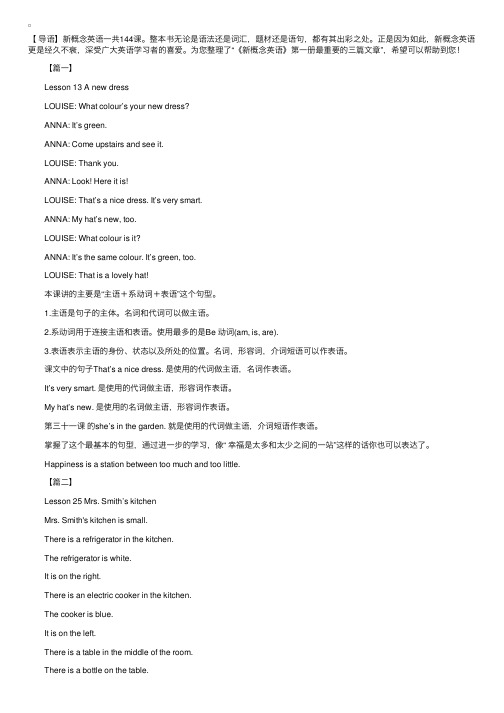
【导语】新概念英语⼀共144课。
整本书⽆论是语法还是词汇,题材还是语句,都有其出彩之处。
正是因为如此,新概念英语更是经久不衰,深受⼴⼤英语学习者的喜爱。
为您整理了“《新概念英语》第⼀册最重要的三篇⽂章”,希望可以帮助到您! 【篇⼀】 Lesson 13 A new dress LOUISE: What colour’s your new dress? ANNA: It’s green. ANNA: Come upstairs and see it. LOUISE: Thank you. ANNA: Look! Here it is! LOUISE: That’s a nice dress. It’s very smart. ANNA: My hat’s new, too. LOUISE: What colour is it? ANNA: It’s the same colour. It’s green, too. LOUISE: That is a lovely hat! 本课讲的主要是“主语+系动词+表语”这个句型。
1.主语是句⼦的主体。
名词和代词可以做主语。
2.系动词⽤于连接主语和表语。
使⽤最多的是Be 动词(am, is, are). 3.表语表⽰主语的⾝份、状态以及所处的位置。
名词,形容词,介词短语可以作表语。
课⽂中的句⼦That’s a nice dress. 是使⽤的代词做主语,名词作表语。
It’s very smart. 是使⽤的代词做主语,形容词作表语。
My hat’s new. 是使⽤的名词做主语,形容词作表语。
第三⼗⼀课的she’s in the garden. 就是使⽤的代词做主语,介词短语作表语。
掌握了这个最基本的句型,通过进⼀步的学习,像“ 幸福是太多和太少之间的⼀站”这样的话你也可以表达了。
Happiness is a station between too much and too little. 【篇⼆】 Lesson 25 Mrs. Smith’s kitchen Mrs. Smith's kitchen is small. There is a refrigerator in the kitchen. The refrigerator is white. It is on the right. There is an electric cooker in the kitchen. The cooker is blue. It is on the left. There is a table in the middle of the room. There is a bottle on the table. The bottle is empty. There is a cup on the table, too. The cup is clean. 本课主要讲的是There be 的结构,该结构表达某地存在某物。
新概念英语第一册课文详解及英语语法(全)
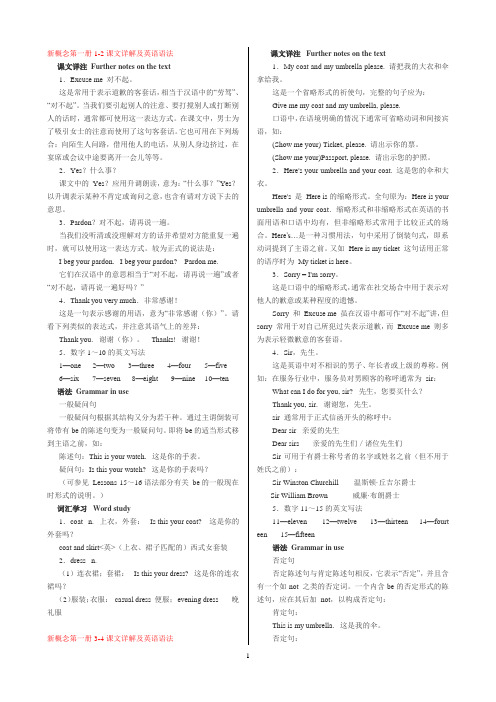
新概念第一册1-2课文详解及英语语法课文详注Further notes on the text1.Excuse me 对不起。
这是常用于表示道歉的客套话,相当于汉语中的“劳驾”、“对不起”。
当我们要引起别人的注意、要打搅别人或打断别人的话时,通常都可使用这一表达方式。
在课文中,男士为了吸引女士的注意而使用了这句客套话。
它也可用在下列场合:向陌生人问路,借用他人的电话,从别人身边挤过,在宴席或会议中途要离开一会儿等等。
2.Yes?什么事?课文中的Yes?应用升调朗读,意为:“什么事?”Yes?以升调表示某种不肯定或询问之意,也含有请对方说下去的意思。
3.Pardon?对不起,请再说一遍。
当我们没听清或没理解对方的话并希望对方能重复一遍时,就可以使用这一表达方式。
较为正式的说法是:I beg your pardon. I beg your pardon? Pardon me.它们在汉语中的意思相当于“对不起,请再说一遍”或者“对不起,请再说一遍好吗?”4.Thank you very much.非常感谢!这是一句表示感谢的用语,意为“非常感谢(你)”。
请看下列类似的表达式,并注意其语气上的差异: Thank you. 谢谢(你)。
Thanks! 谢谢!5.数字1~10的英文写法1—one 2—two 3—three 4—four 5—five6—six 7—seven 8—eight 9—nine 10—ten语法Grammar in use一般疑问句一般疑问句根据其结构又分为若干种。
通过主谓倒装可将带有be的陈述句变为一般疑问句。
即将be的适当形式移到主语之前,如:陈述句:This is your watch. 这是你的手表。
疑问句:Is this your watch? 这是你的手表吗?(可参见Lessons 15~16语法部分有关be的一般现在时形式的说明。
)词汇学习Word study1.coat n. 上衣,外套:Is this your coat? 这是你的外套吗?coat and skirt<英>(上衣、裙子匹配的)西式女套装2.dress n.(1)连衣裙;套裙:Is this your dress? 这是你的连衣裙吗?(2)服装;衣服:casual dress 便服;evening dress 晚礼服新概念第一册3-4课文详解及英语语法课文详注Further notes on the text1.My coat and my umbrella please. 请把我的大衣和伞拿给我。
新概念第一册知识点整理
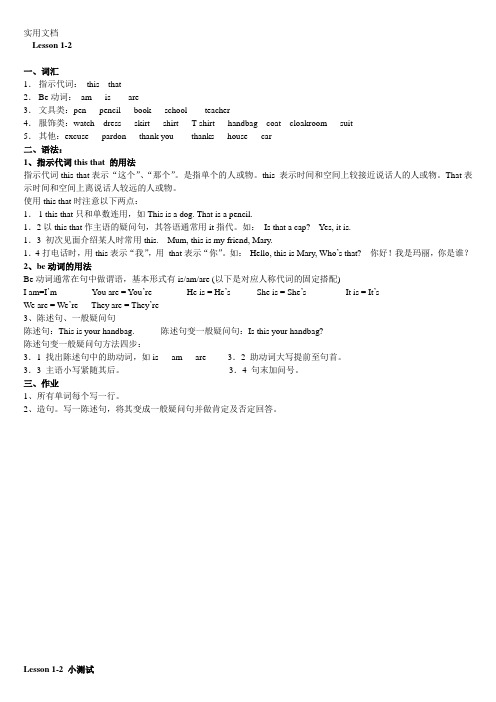
Lesson 1-2一、词汇1.指示代词:this that2.Be动词:am is are3.文具类:pen pencil book school teacher4.服饰类:watch dress skirt shirt T-shirt handbag coat cloakroom suit5.其他:excuse pardon thank you thanks house car二、语法:1、指示代词this that 的用法指示代词this that表示“这个”、“那个”。
是指单个的人或物。
this 表示时间和空间上较接近说话人的人或物。
That表示时间和空间上离说话人较远的人或物。
使用this that时注意以下两点:1.1 this that只和单数连用,如This is a dog. That is a pencil.1.2以this that作主语的疑问句,其答语通常用it指代。
如:Is that a cap? Yes, it is.1.3 初次见面介绍某人时常用this. Mum, this is my friend, Mary.1.4打电话时,用this表示“我”,用that表示“你”。
如:Hello, this is Mary, Who’s that? 你好!我是玛丽,你是谁?2、be动词的用法Be动词通常在句中做谓语,基本形式有is/am/are (以下是对应人称代词的固定搭配)I am=I’m You are = You’re He is = He’s She is = She’s It is = It’sWe are = We’re They are = They’re3、陈述句、一般疑问句陈述句:This is your handbag. 陈述句变一般疑问句:Is this your handbag?陈述句变一般疑问句方法四步:3.1 找出陈述句中的助动词,如is am are 3.2 助动词大写提前至句首。
(完整版)新概念英语1A知识点总结
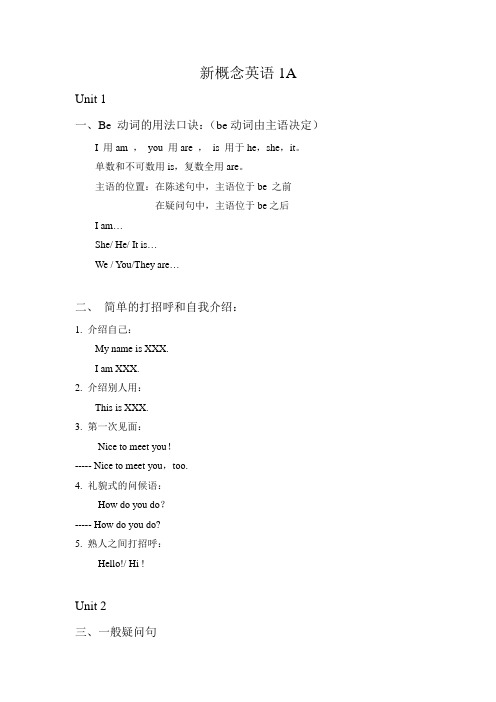
新概念英语1A Unit 1一、Be 动词的用法口诀:(be动词由主语决定)I 用am ,you 用are ,is 用于he,she,it。
单数和不可数用is,复数全用are。
主语的位置:在陈述句中,主语位于be 之前在疑问句中,主语位于be之后I am…She/ He/ It is…We / You/They are…二、简单的打招呼和自我介绍:1. 介绍自己:My name is XXX.I am XXX.2. 介绍别人用:This is XXX.3. 第一次见面:Nice to meet you!----- Nice to meet you,too.4. 礼貌式的问候语:How do you do?----- How do you do?5. 熟人之间打招呼:Hello!/ Hi !Unit 2三、一般疑问句1. 定义(什么叫做一般疑问句):可以用Yes或No来回答的问句。
2. 陈述句变一般疑问句步骤(怎么变?):①调:调换主语与be 的位置到句首。
②改:A:改写大小。
B:该人称:I(我)→you(你),we(我们)→you(你们),my (我的)→your(你的),am(用于I)→are(用于you等复数人称)C:将句号“.”改成问号“?”3. 回答:①肯定回答:Yes,主语+be.②否定回答:No,主语+be+not. (am与not不缩写)例:陈述句:This is my pen. 这是我的钢笔。
一般疑问句:Is this your pen? 这是你的钢笔吗?肯定回答:Yes, it is. 是的,这是我的钢笔。
否定回答:No, it is not(isn’t). 不,这不是我的钢笔。
4. Be动词的否定式:①:Be 的现在式:am , is , are②:Be 的过去式:was ,were③:否定式:is not= isn’t , are not=aren’t , am not无缩写形式四、冠词a/ an 的用法1. a + 以辅音发音开头的单词例:a hat , a man , a university [ˌju:nɪˈvɜ:səti]an + 以元音发音开头的单词例:an apple [ˈæpl] ,an orange [ˈɒrɪndʒ],an egg [eg],an uncle [ˈʌŋkl],an hour [ˈaʊə(r)]2. 单个字母出现在“Mr Li has one fox”中任何一个字母均用an例:an M an H an SUnit 3五、特问词的运用1. 特问词:What 问物(什么)How old 问年龄(多少岁)Who 问人(谁)How many/ much…?多少…?Whose 问谁的How 怎样What colour 问颜色Where 问哪里Which 哪一个(选择)When 问时间(什么时候)=what time2.例子① What is this?(问物)---- It is a bicycle. It is a silver bicycle.② Whose is this umbrella ?(问谁的)---- It’s William’s.③ What colour is Robert’s bicycle? (问颜色+问谁的)---- Robert’s bicycle is silver.六、对划线部分提问的做题技巧1. 选特问词。
新概念英语第一册重点词汇及语法完整版
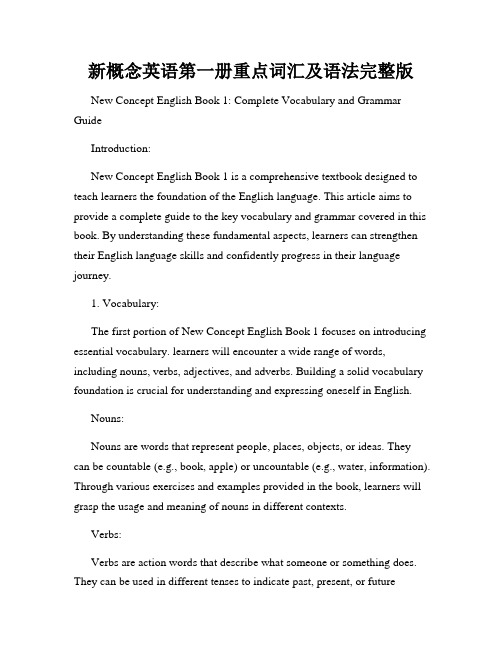
新概念英语第一册重点词汇及语法完整版New Concept English Book 1: Complete Vocabulary and Grammar GuideIntroduction:New Concept English Book 1 is a comprehensive textbook designed to teach learners the foundation of the English language. This article aims to provide a complete guide to the key vocabulary and grammar covered in this book. By understanding these fundamental aspects, learners can strengthen their English language skills and confidently progress in their language journey.1. Vocabulary:The first portion of New Concept English Book 1 focuses on introducing essential vocabulary. learners will encounter a wide range of words, including nouns, verbs, adjectives, and adverbs. Building a solid vocabulary foundation is crucial for understanding and expressing oneself in English.Nouns:Nouns are words that represent people, places, objects, or ideas. They can be countable (e.g., book, apple) or uncountable (e.g., water, information). Through various exercises and examples provided in the book, learners will grasp the usage and meaning of nouns in different contexts.Verbs:Verbs are action words that describe what someone or something does. They can be used in different tenses to indicate past, present, or futureactions. Examples include "to run," "to eat," and "to sleep." The book provides ample opportunities for learners to practice using verbs correctly.Adjectives:Adjectives are words that modify or describe nouns. They add details and attributes to enhance understanding. Examples of adjectives are "beautiful," "tall," and "friendly." By learning the proper use of adjectives, learners can effectively express their thoughts and opinions.Adverbs:Adverbs modify verbs, adjectives, or other adverbs. They provide information about how an action is performed. Examples include "quickly," "carefully," and "eagerly." In this book, learners will encounter adverbs that help them express themselves more precisely.2. Grammar:In addition to vocabulary, New Concept English Book 1 covers fundamental grammar rules. Mastering these rules enables learners to construct meaningful sentences and communicate effectively.Sentence Structure:Understanding sentence structure is vital in constructing grammatically correct sentences. A sentence generally consists of a subject (a noun or pronoun) and a predicate (a verb or verb phrase). The book offers various exercises to familiarize learners with sentence construction.Tenses:Tenses indicate the time when an action takes place. In English, there are mainly three tenses: past, present, and future. Each tense has different forms and rules. By studying the tenses explained in this book, learners will acquire the knowledge necessary to express themselves accurately in different time frames.Articles:Articles are small words that precede nouns. They include "a," "an," and "the." Correct article usage is essential for conveying specificity and understanding between the speaker and the listener. New Concept English Book 1 provides extensive practice exercises to improve article usage skills.Prepositions:Prepositions are words that show the relationship between nouns or pronouns and other words in a sentence. Examples of common prepositions are "in," "on," "at," and "to." Understanding prepositions is essential for indicating time, place, direction, and manner. The book includes explanations and examples to guide learners through the proper usage of prepositions.Conclusion:New Concept English Book 1 serves as a comprehensive guide for learners starting their English language journey. By thoroughly studying the vocabulary and grammar presented in this book, learners will establish a strong foundation. This article has provided an overview of the key vocabulary and grammar covered in the book, highlighting the importance ofeach aspect. By dedicating time and effort to practice, learners can confidently progress and unlock their potential in the English language.。
新概念英语第一册写作

Reference:
Tian’anmen Square is very large and beautiful. On the north of it is the red Tian’anmen Gate. Tian’anmen Gate is tall. There are five gates in it. The gate in the middle is the largest. Chairman Mao’s big photo is fixed above the gate. On the south is the grand Chairman Mao Memorial Hall. In the centre stands the Monument to the people’s Heroes. The monument is very high. On the east side of the square is the Museum of Chinese History. On the west of it is the Great Hall of the People.
描写类看图书面表达的步骤:
• 认真审图,确立时态; • 提炼要点,找出动作; • 纵观全图,调整顺序; • 连句成篇,过渡自然。
Key sentences or phrases
• There is/are… • Near • On the east/west/north/south • In the middle (of) • On the right/left side
• There is a city before us. The city lies before us.
• There is a house by the mountain. The house stands by the mountain.
《新概念英语》第一册经典必备
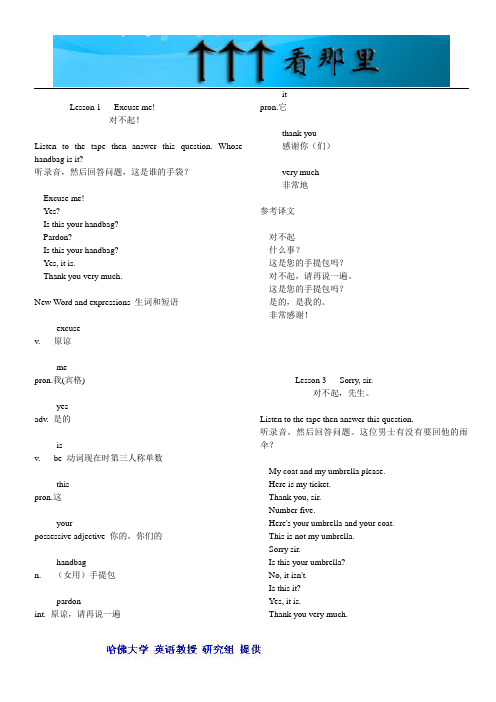
Lesson 1 Excuse me!对不起!Listen to the tape then answer this question. Whose handbag is it?听录音,然后回答问题,这是谁的手袋?Excuse me!Y es?Is this your handbag?Pardon?Is this your handbag?Y es, it is.Thank you very much.New Word and expressions 生词和短语excusev. 原谅mepron.我(宾格)yesadv. 是的isv. be 动词现在时第三人称单数thispron.这yourpossessive adjective 你的,你们的handbagn. (女用)手提包pardonint. 原谅,请再说一遍itpron.它thank you感谢你(们)very much非常地参考译文对不起什么事?这是您的手提包吗?对不起,请再说一遍。
这是您的手提包吗?是的,是我的。
非常感谢!Lesson 3 Sorry, sir.对不起,先生。
Listen to the tape then answer this question.听录音,然后回答问题。
这位男士有没有要回他的雨伞?My coat and my umbrella please.Here is my ticket.Thank you, sir.Number five.Here's your umbrella and your coat.This is not my umbrella.Sorry sir.Is this your umbrella?No, it isn't.Is this it?Y es, it is.Thank you very much.New words and Expressions 生词和短语umbrellan. 伞pleaseint. 请hereadv. 这里mypossessive adjective 我的ticketn. 票numbern. 号码fivenum. 五sorryadj. 对不起的sirn. 先生cloakroomn. 衣帽存放处参考译文请把我的大衣和伞拿给我。
- 1、下载文档前请自行甄别文档内容的完整性,平台不提供额外的编辑、内容补充、找答案等附加服务。
- 2、"仅部分预览"的文档,不可在线预览部分如存在完整性等问题,可反馈申请退款(可完整预览的文档不适用该条件!)。
- 3、如文档侵犯您的权益,请联系客服反馈,我们会尽快为您处理(人工客服工作时间:9:00-18:30)。
新概念英语第一册写作必备——功能句型1. as… as… 结构as soon as 一……就……例:I will tell him as soon as I see him.as soon as possible 尽快例:He asked me to come back as soon as possible.as +形容词或副词的原级+as 像…一样例:This building looks as high as that one.2. ask 句型ask (sb.) for sth. 向……要/求……例:He felt too ashamed to ask us for help.ask/tell sb. (how) to do sth. 告诉某人怎么做某事例:They asked / told us to return the book on time.ask/tell sb. (not) to do sth. 让某人(不要)做某事例:The old man asked / told us not to swim in the river.3. get句型get +比较级变得……例:People’s life is getting better and better.get ready for/get sth. ready 为…做好了准备/准备好了……例:We should get ready for the difficulty.4. keep 句型keep sb. doing 让某人一直做某事例:He kept me waiting for half an hour.keep doing 坚持做某事例:Keep studying, maybe one day you can join us.keep/make sth. + adj. 让……怎么样例:The teacher asked us to keep the classroom clean.The news made her happy.5. find 句型find it + adj. to do sth. 发现做某事怎么样例:They found it impossible to get enough money.find sb. do/doing sth. 发现某人做/正在做某事例:I find the boys flying kites in Tian’anmen Squa re.6. help句型help sb. (to) do / help sb. with sth. 帮助某人做某事/在……方面帮助某人例:They helped us to cross the river.My brother helped me with the problem.7. 四个花费sb. spend some time/some money on sth. / (in) doing sth.例:We spent much time reading.Don’t spend so much money on clothes.It takes sb. some time to do sth.例:It takes me half an hour to read books every day.It cost sb. some money to do sth. / sth. cost sb. some money例:It cost me 200 yuan to buy the wallet.The wallet cost me 200 yuan.sb pays some money for sth.例:I paid 200 yuan for the wallet.8. prefer 句型prefer to 更喜欢做某事例:I prefer cats to dogs.Prefer A to B / prefer to doing A to doing B 喜欢A胜过B /喜欢做A胜过做B 例:We prefer to eat out.I prefer doing homework to going shopping with you.9. see/hear sb. do/doing sth. 看见/听见某人做/正在做某事例:I saw him come into your room.I hear him singing songs next door.10. afraid 句型be afraid of sth. / doing sth./ to do sth. / that 害怕某事/做某事/……例:She is afraid of spiders.I am afraid of staying at home alone. = I am afraid to stay at home alone.She was afraid that the dog would bite.I’m afraid that … 恐怕……例:I’m afraid that I cannot go with you.11. busy 句型be busy doing sth. 忙于做某事例:He was busy finishing his work.12. be + adj. + for 句型be famous/late/sorry for …因……而著名/迟到……/对……抱歉例:He was late for school yesterday.New York is famous for tall buildings.I’m sorry for your father’s death.13. glad句型be glad that 很高兴……例:I’m glad that he’s feeling better.14. 就近一致的句型either … or要么……要么……例:You can either write or phone me.neither…nor既不…也不…例:He neither knows nor cares what happened.not only … but also不仅…而且…例:Not only my parents but also my sister has been to the Great Wall.There be 有例:There is a bed, a table and some chairs in her bedroom.15. 比较级句型It is the second + 最高级+ n. 这是第二……例:It is the second most expensive hat.…is one of the + 最高级+ n (pl) …最……之一例:It is one of the highest buildings in the world.The + 比较级, … the + 比较级…越……, 越……例:The harder he works, the happier he feels.比较级and 比较级越来越…例:Our motherland is becoming stronger and stronger.16. V+doing 句型enjoy/hate/like/finish/stop/mind/keep/go on + doing sth. 例: He enjoys / likes watching TV at home.I hate working on Sundays.They finished / kept / went on repairing the broken bike.I don’t mind going shopping tomorrow.The students stopped talking when the teacher came in.17. V+sth. to sb. 句型give/show/bring/lend/send/pass/tell sth. to sb.例:Please pass / show / lend / bring / send the book to me.My mother told the story to me.He gave the picture to Tom yesterday.18. V + sb. sth.buy/give/show/bring/lend/send/pass/tell sb. sth.例:My father bought / gave / showed / passed me the new bike.Kate told me the news.He lent / sent / gave me his new dictionary.19. V+ sb. do sth.make / let / have sb. (not) do sth.例:The teacher made / let / had the students clean the classroom.20. had better 句型had better (not) do sth. 最好做/不要做某事例: You’d better study hard. / You’d better not smoke.21. It句型It is + adj. for sb. to do sth. 做某事怎么样例:It is important for us to protect the environment.It looks like / It sounds like …看起来像/听起来像例:It looks like a cartoon character.It sounds like a nice room.It seems to sb. that 看起来……例:It seems to us that he knew everything.It sounds + adj. / It looks + adj. 听起来……/看起来……例:It sounds great!It looks nice!It’s bad / good for...对……不好/有好处例:It’s bad for us to watch TV for a long time.It’s good for us to get up early.It’s time for / to do sth.该……了例:It’s time to go home.It’s time for dinne r.It’s two meters (years) long (wide, high, tall …)……长/高/宽例:It’s ten meters high.22. not … at all一点也不例:I don’t want to play football at all.23. not … until…直到……才例:He didn’t come home until 2 o’clock.24. one … the other / some … others一个…… 另一个/ 一些…… 另一些例:I have two aunts; one lives in Tokyo and the other in Osaka.25. so … that…如此…… 以至例:The box is so heavy that we couldn’t carry it.26. such a + adj + n + that 如此…… 以至例:It is such an interesting book that we all want to read it.27. too … to … 句型太…… 而不能例:He is too young to go to school.28. thank sb. for sth. / doing sth. 为…… 感谢某人例:Thank you for your help. / Thank you for helping me.29. used 句型used to do sth. 过去常常做某事/ be (get,become) used to sth./doing sth. 习惯做某事例:He used to smoke.He is used to hard work. / He gets used to getting up early.30. take和bring例:Please bring me some coffee. (带来) I took an umbrella with me. (带走)31. wrong 和matter 句型There is sth. wrong with ….What’s the matter with …?What’s wrong with …?例:There is something wrong with my computer.What’s the matter with your bike?What’s wrong with your bike?32 表达自己和询问别人的意见I don’t think that …I would like to / Would you like to …Why not do / Why don’t you do sth.?Will (Would, Could) you please do sth.?What about /How about doing sth.?It’s a good idea to do sth.例:I don’t think that he can win the match.I would like to go for a walk.Would you like to / please go with me?Why not go with me? / Why don’t you go home?How / What about going swimming this afternoon?It’s a good idea to watch English movies to improve your listening.新概念英语一册补充语法:英语数量词大全数词主要分为基数词和序数词两类。
